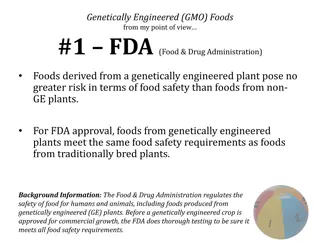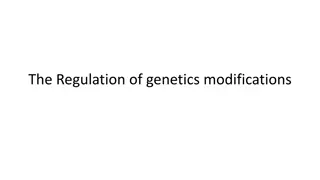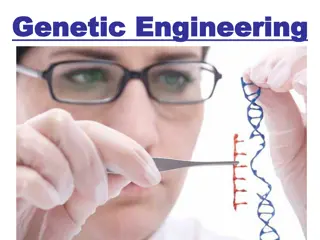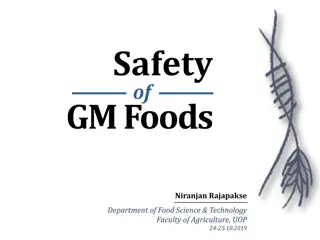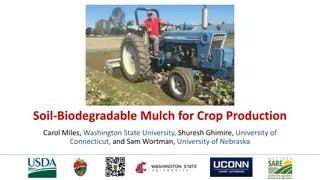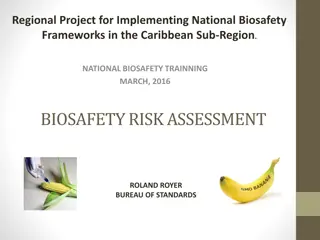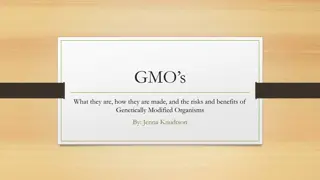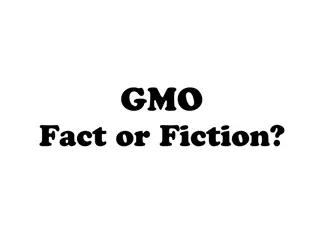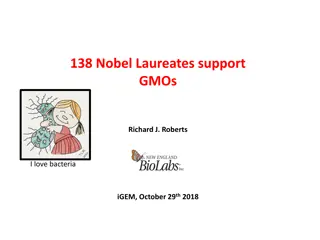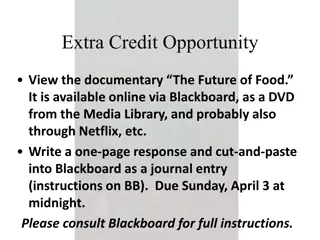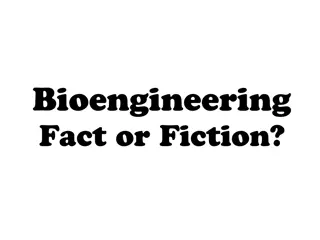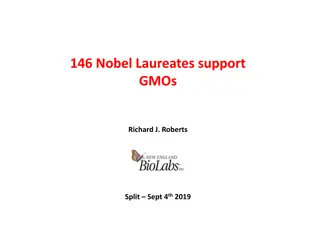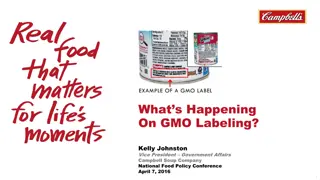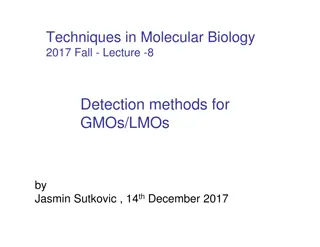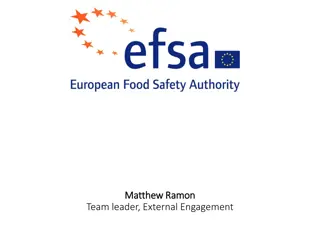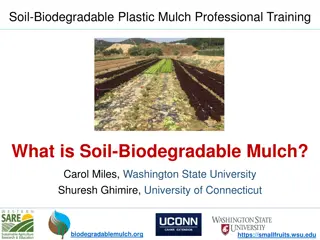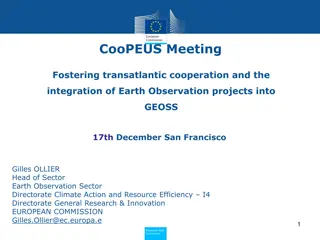Trends in Agro-Food Logistics Management
Explore emerging trends in global agro-food logistics and supply chains, including disruptions, implications, and opportunities. Learn about challenges like food losses, regulatory changes, resistance to GMOs, and more. Gain insights into the changing landscape of food systems.
2 views • 24 slides
Understanding Genetically Engineered Foods: Perspectives and Insights
FDA ensures the safety of genetically engineered (GMO) foods, EPA reviews their environmental impact, farmers benefit from improved crop management, some consumers prefer non-GMO products, and nutritionally, GM foods are similar to non-GM. While scientific consensus supports the safety of GMOs, glob
1 views • 6 slides
GMOs in Pakistan: Challenges and Potential in Agriculture Sector
Pakistan, an agriculture-based country, faces food security challenges due to issues like drought and climate change. With Bt cotton as the only approved GM crop, there are opportunities for enhanced production and disease resistance. However, concerns exist regarding safety, standards, labeling, an
0 views • 13 slides
The Regulation of Genetics Modifications in Biotechnology
Biotechnology plays a significant role in engineering plants and regulating food crops through genetic modifications. The use of modern biotechnology, such as genetically modified organisms (GMOs), has grown exponentially worldwide. Advantages include increased agricultural productivity and improved
0 views • 11 slides
Understanding Genetic Engineering and Selective Breeding
Genetic engineering involves changing the DNA in living organisms to create new traits, resulting in genetically modified organisms (GMOs). Techniques include artificial selection, cloning, gene splicing, and gel electrophoresis. Selective breeding is a form of artificial selection where animals wit
4 views • 37 slides
Understanding the Safety and Regulation of GMO Foods
Explore the importance of genetically modified organisms (GMOs) in healthcare, agriculture, and food industry, along with the safety concerns, regulatory assessments, and international standards associated with GMO foods. Learn about the benefits, potential risks, and management strategies for ensur
1 views • 21 slides
Sustainable Mulching Practices for Enhanced Crop Production
Implementing soil-biodegradable mulch in crop production offers an eco-friendly alternative to traditional polyethylene mulch. Benefits include weed control, soil moisture retention, and temperature regulation, with comparable yields to polyethylene mulch. Certified biodegradable options are availab
0 views • 8 slides
Understanding Risk Assessment for Biosafety in the Caribbean Sub-Region
Risk assessment is a structured approach to evaluating the potential harm from activities involving genetically modified organisms (GMOs) in order to protect health and the environment. It involves identifying, characterizing, and evaluating risks to determine the level of concern and the need for m
0 views • 16 slides
Understanding GMOs: Risks, Benefits, and Production Methods
GMOs, or genetically modified organisms, are foods made from organisms with altered DNA through genetic engineering. This article explores the history of GMOs, how they are made, their risks such as potential environmental impacts and allergenicity, as well as benefits including increased crop yield
2 views • 7 slides
Understanding GMOs: Myths and Facts
GMOs, or genetically modified organisms, are not created by injecting chemicals into food after harvesting. Instead, they are developed through genetic engineering before planting. The process involves inserting specific traits into the DNA of seeds. GMOs undergo thorough evaluation by regulatory ag
1 views • 13 slides
Nobel Laureates Support GMOs: A Call for Science Honesty
138 Nobel Laureates advocate for the safety and support of GMO technology to benefit the developing world by enhancing crop yield and nutritional value. They challenge misconceptions around GMOs and encourage a more informed, science-based dialogue. The letter addressed to Greenpeace and UN ambassad
6 views • 35 slides
The Impact of GMOs on Agriculture and Society
Genetically Modified Organisms (GMOs) are created through genetic engineering techniques like biolistics and Agrobacterium tumefaciens. These modifications are made to confer herbicide resistance, pathogen resistance, control fruit ripening/rotting, and increase production. The documentary explores
2 views • 45 slides
Understanding GMOs: The Science and Impact
Bioengineered crops, or GMOs, are developed through genetic engineering to enhance specific traits. Despite thorough evaluation by regulatory bodies, GMOs have become prevalent in the market, especially in livestock feed production. While organic products offer a non-GMO guarantee, the adoption of b
21 views • 13 slides
Nobel Laureates' Support for GMOs and Food as Medicine
The article highlights the support of 146 Nobel Laureates for GMO technology, emphasizing its safety and importance for addressing world hunger. It also discusses the role of food as medicine and the need for promoting science honesty regarding GMOs. The message calls for the encouragement of GMOs f
1 views • 35 slides
Understanding the Current Landscape of GMO Labeling: Insights from Campbell Soup Company
Explore the evolution of GMO labeling, from defining GMOs to legislative developments and industry responses. Key points include the history of GMOs in food, global perspectives, state mandates like Vermont's Act 120, and how major food corporations are navigating the changing landscape. Follow the
2 views • 19 slides
Detection Methods for GMOs and LMOs in Molecular Biology
Techniques in Molecular Biology lecture discusses GMOs and LMOs, transgenic plants, examples like Bt cotton and Golden rice, detection methods, purpose of detection, and how transgenic plants are created. The content emphasizes the need to differentiate GM crops from non-GM crops and the importance
2 views • 40 slides
GMOs in the EU: Public Perception and Regulatory Practices
The European Union's stance on GMO cultivation and marketing is characterized by a single approved product, MON 810, designed to protect maize against the European corn borer. While public awareness of GMOs is high, there is substantial opposition across EU Member States, leading to opt-outs based o
0 views • 10 slides
Understanding Soil-Biodegradable Plastic Mulch in Agriculture
Soil-biodegradable mulch, a sustainable alternative to polyethylene mulch, offers benefits like weed control, moisture retention, and increased crop yield. Introduced in the 1990s, these mulches are made from various biobased polymers and feedstocks, with considerations for biodegradation and GMOs i
0 views • 10 slides
Fostering Transatlantic Cooperation in Earth Observation Projects through GEOSS
Meeting held in San Francisco discussing the integration of Earth Observation projects into GEOSS, highlighting the importance of GEO and collaboration between the US and EU. Examples include global initiatives like GFOI, GMOS, and GEO BON. Emphasis on the Water Community of Practice and the assessm
0 views • 12 slides

